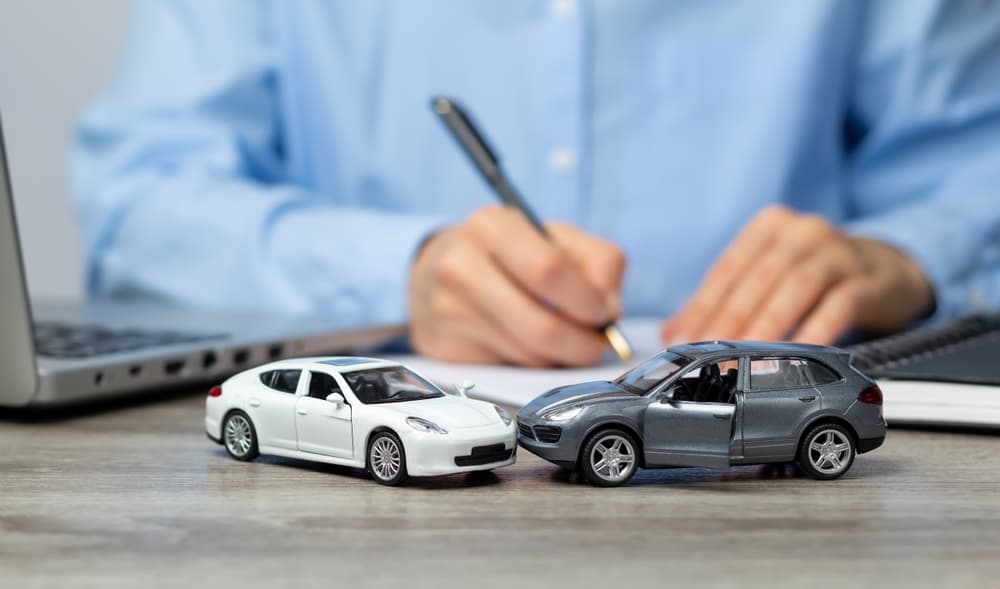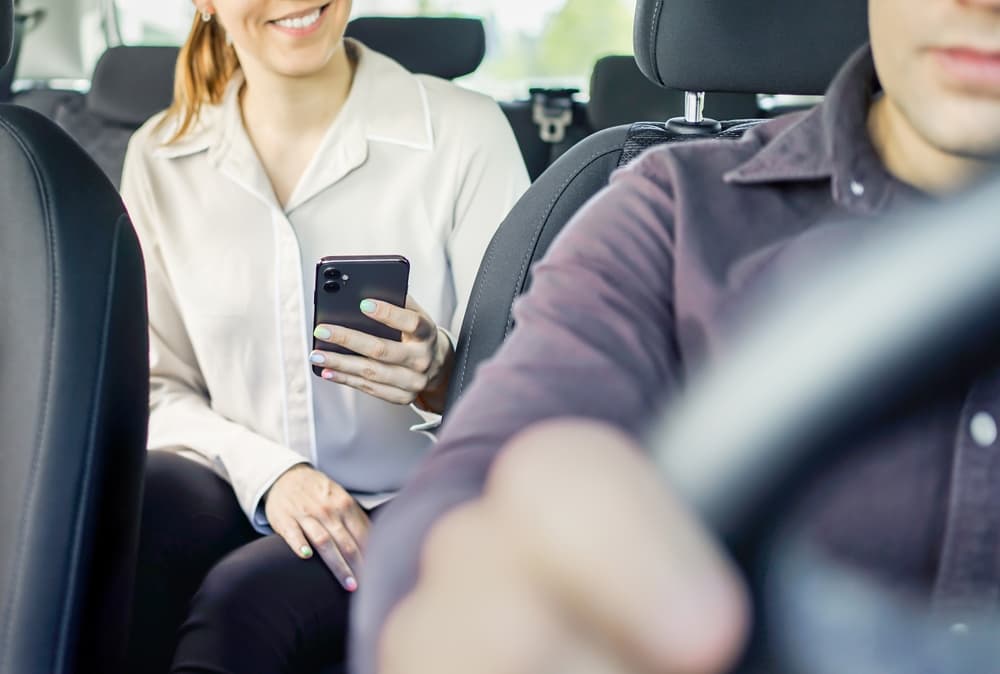If you find yourself a passenger in an Uber or Lyft that's involved in a crash, it's a jarring experience. Your first thoughts should be about your safety and getting any necessary medical attention. After the immediate aftermath, you'll need to understand how insurance coverage works and what your rights are as a passenger. This guide walks you through these steps.
If you have questions or need to discuss your situation, reach out a passenger injury attorney for uber & lyft accident at (312) 767-7950.
Medical Attention: Why "Feeling Fine" Isn't Good Enough

You’ve made it away from the immediate scene, and you’re perhaps now at home a bit shaken up. If you think you’re okay, think again. That feeling of being "fine" might be a trick your body is playing on you.
The Adrenaline Lie: Why You Might Not Feel Pain Immediately.
During a traumatic event like a car crash, your body floods with adrenaline. This hormonal surge effectively masks pain and other symptoms of injury. It’s a survival mechanism, but it also means that serious injuries go unnoticed for hours or even days.
Get Checked Out by a Doctor. Period.
Even if you declined an ambulance at the accident scene, see a doctor as soon as possible. Some common delayed-onset injuries include whiplash, back injuries, concussions, and even internal bleeding. A medical examination will identify any underlying injuries and, importantly, create a medical record. This record links your injuries directly to the accident—fundamental evidence for any insurance claim or legal action.
What might feel like a minor ache might be a sign of something more significant. Don't take chances with your health.
Follow Medical Advice Religiously.
If your doctor recommends a course of treatment, follow-up appointments, or rest, stick to it precisely. Not following medical advice harms your physical recovery. It also negatively impacts any insurance claim you make. Insurance companies scrutinize medical records and adherence to treatment plans.
Who Pays When You’re a Passenger?
The question of "who pays?" is a big one after being a passenger in an Uber or Lyft crash. Fortunately, as a passenger, you're generally in a better position than if you were one of the drivers.
The Good News: Passengers Are Usually in a Strong Position.
Since you were not operating either vehicle, it's almost certain that you won't be found at fault for causing the accident. This generally simplifies things when it comes to seeking compensation for your injuries and damages.
The Layers of Coverage – It’s Not Always Simple:
Several insurance policies might apply, and figuring out the order can be tricky.
- The At-Fault Driver's Insurance: If another driver (not your Uber or Lyft driver) caused the collision, their auto liability insurance is typically the first resource for covering your damages.
In Illinois, all drivers are required to carry minimum liability coverage. These minimums include $25,000 for bodily injury or death per person, $50,000 total for bodily injury or death per accident, and $20,000 for property damage. However, for serious injuries, these minimums might not be sufficient to cover all your losses. - Your Uber/Lyft Driver's Insurance (if they were at fault): If your rideshare driver is responsible for the accident, their personal auto insurance might apply. However, many personal auto policies have exclusions for commercial activities like driving for Uber or Lyft unless the driver has a specific rideshare endorsement.
- Uber/Lyft’s Insurance Coverage – The Big Safety Net: Rideshare companies like Uber and Lyft carry substantial insurance policies to cover passengers when a ride is in progress. This coverage is generally active from the time your driver accepts the ride request until the trip ends in the app.
This typically includes:- Liability coverage: If your Uber or Lyft driver is at fault, these policies provide up to $1 million (or more, depending on the specific circumstances and jurisdiction) in coverage for injuries and damages.
- Uninsured/Underinsured Motorist (UM/UIM) coverage: This is a critical protection for you if the at-fault driver (whether it's your rideshare driver or a third-party driver) has no insurance or not enough insurance to cover your full damages.
Why You Should Seriously Consider Talking to a Lawyer

The thought of involving lawyers is often intimidating for some, often conjuring images of drawn-out court battles. But for a passenger in an Uber or Lyft crash, consulting an attorney is less about aggression and more about protection and guidance.
This Isn’t Just Another Fender Bender.
Rideshare accidents have more layers of complexity than a typical two-car collision. You have your driver, potentially another driver involved in the crash, and the multi-billion dollar rideshare company (Uber or Lyft) itself. Each of these parties will have their own insurance adjusters and legal teams looking out for their interests, not yours.
Insurance Companies Aren't Your Buddies.
It's a hard truth, but insurance adjusters work for the insurance company. Their primary objective is to protect the company's bottom line, which means paying out as little as possible on claims. They are skilled negotiators and often try to get you to accept a quick, low settlement offer before you even know the full extent of your injuries or future medical needs. They might also ask for a recorded statement that they might later use to undermine your claim.
What a Lawyer Does for You:
An experienced rideshare accident attorney does much more than just file lawsuits. They act as your advocate and guide through a complex process:
- Investigate the Crash: They will work to gather all evidence, including police reports, witness statements, photos/videos from the scene, and driver records, to independently determine fault.
- Confirm App Status: This is a critical detail in rideshare cases, as the insurance coverage that applies (the driver's personal policy or the rideshare company's commercial policy) often depends on whether the driver was logged into the app, en route to pick you up, or actively transporting you.
- Handle the Insurance Companies: Lawyers are fluent in "insurance-speak" and know the tactics adjusters use. They manage all communications, taking this significant stress off your shoulders.
- Identify ALL Sources of Compensation: Were there multiple parties at fault? An attorney helps identify all potential avenues for recovering damages.
- Accurately Value Your Claim: A personal injury claim isn't just about your immediate medical bills. It includes current and future medical expenses, lost wages (if you're unable to work), pain and suffering, emotional distress, and any long-term impact on your quality of life.
- Navigate Legal Procedures: There are specific rules and deadlines for filing claims and lawsuits. For instance, in Illinois, the statute of limitations for personal injury claims is generally two years from the date of the accident, as per 735 ILCS 5/13-202. Missing this deadline means you lose your right to seek compensation through the courts.
You Don’t Pay Upfront.
Most personal injury lawyers, including LegalRideshare Injury Lawyers, work on a contingency fee basis. This means their fee is a percentage of the settlement or judgment they obtain for you. If they don't win your case, you typically don't pay them attorney fees.
When to Call:
Sooner rather than later is generally the best approach. Evidence gets lost or degrades over time, and witness memories can fade.
If you're unsure, it costs nothing to call LegalRideshare Injury Lawyers at (312) 767-7950 for a straightforward conversation about your situation.
What You Should and Shouldn’t Say or Do

At the Scene:
- DO get all necessary information from drivers and witnesses.
- DON’T admit fault or apologize for anything. Even a simple "I'm sorry" is often twisted and used to suggest you believe you were somehow responsible. Let the police and insurance investigations determine fault.
- DON’T discuss insurance policy limits with other drivers at the scene.
With Insurance Adjusters, Before You’ve Talked to a Lawyer:
- DO provide your basic contact information and the factual details of when and where the accident occurred.
- DON’T give a recorded statement without first consulting with a lawyer. Adjusters are trained to ask questions in ways that might elicit responses that harm your claim.
- DON’T sign any documents or accept any settlement offer without getting legal advice. You might be signing away your rights for far less compensation than you truly deserve, especially before the full extent of your injuries is known.
- DON'T downplay your injuries or how you are feeling. Be honest and accurate about any pain or discomfort.
On Social Media:
- DON’T post about the accident, your injuries, or your recovery on social media platforms. Insurance companies routinely search social media for any posts that might contradict your claim. A photo of you at a social event, even if you're in pain, might be used to argue your injuries aren't as severe as you claim. It's best to keep details of the accident and your condition private while your claim is pending.
FAQ for Passengers in an Uber or Lyft Crash
Q1: What if my own car insurance has medical payments (MedPay) coverage? Should I use it?
A: MedPay coverage is a good resource for covering your immediate medical bills, regardless of who was at fault for the accident. Using your MedPay generally doesn’t cause your insurance rates to go up in this scenario because you weren't driving. It helps get medical expenses paid quickly while the more complex liability issues and claims against other insurers are being sorted out. It's a good idea to discuss this with your attorney.
Q2: What if the Uber/Lyft driver asks me not to report the accident or to say I was just a friend in the car?
A: Obviously, you should absolutely NOT agree to this. Failing to report the accident accurately or misrepresenting your status as a paying passenger constitutes insurance fraud. This seriously jeopardizes your ability to receive compensation for your injuries. Always be truthful and accurate about the circumstances of the ride and the accident.
Q3: Can I get compensation for emotional distress or PTSD after a serious rideshare accident?
A: Yes, in many cases, compensation for "pain and suffering" includes emotional distress, anxiety, PTSD, and other psychological impacts. This is especially true if these conditions are documented by a medical or mental health professional and are linked to a significant physical injury or a particularly traumatic crash experience.
Q4: How long will it take to resolve my rideshare accident claim?
A: The timeframe for resolving a rideshare accident claim varies significantly. If fault is clear, injuries are minor, and there are no disputes, a claim often resolves in a matter of months. However, more complex cases, those involving severe injuries, disputed fault, or multiple parties, take much longer, potentially over a year or more, particularly if a lawsuit needs to be filed.
Q5: What if I was on a "shared" or "pool" ride with other passengers? Does that change anything?
A: Fundamentally, your rights as a paying passenger remain the same whether you were on a solo ride or a shared/pool ride. The presence of other passengers might mean there are additional witnesses to the accident, but the insurance principles and the steps you should take to protect your interests are largely identical.
You’ve Been Through Enough: Let LegalRideshare Injury Lawyers Help You Forward
Ready to get clarity and support?
Contact rideshare accident lawyer serving in Chicago, IL at LegalRideshare Injury Lawyers. Call now at (312) 767-7950 or visit our website to understand your options. You don’t have to figure this out alone.